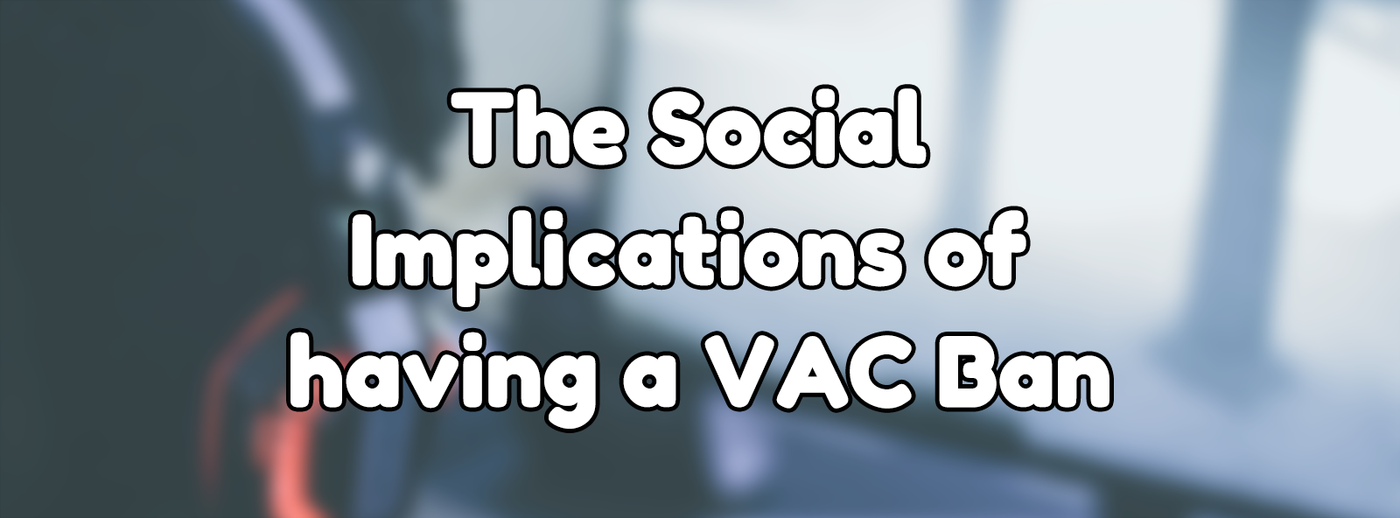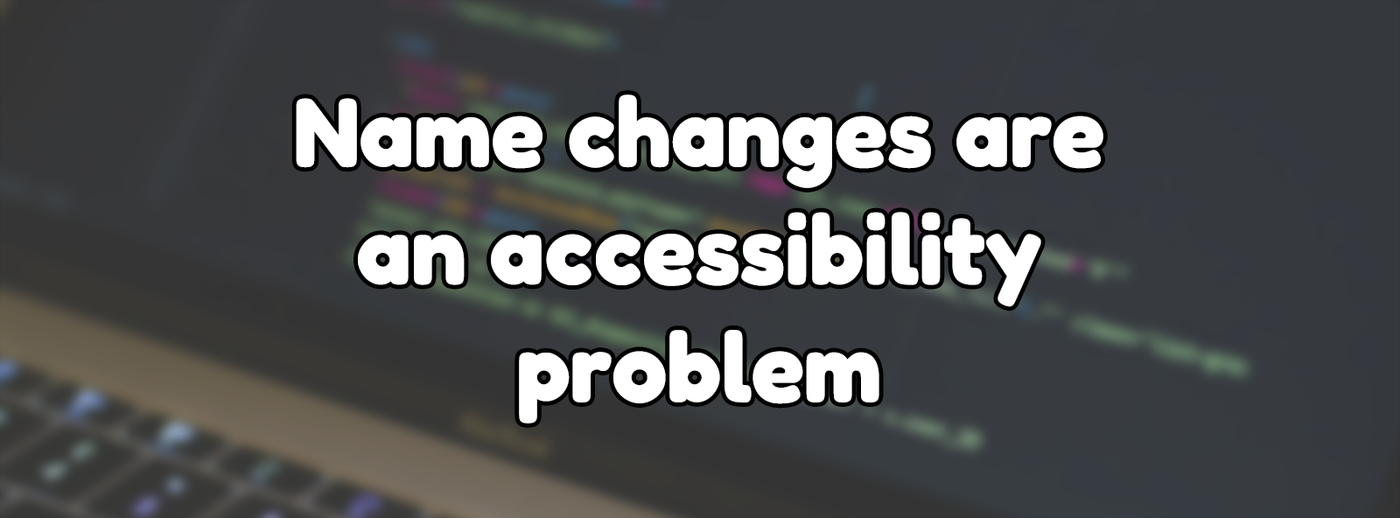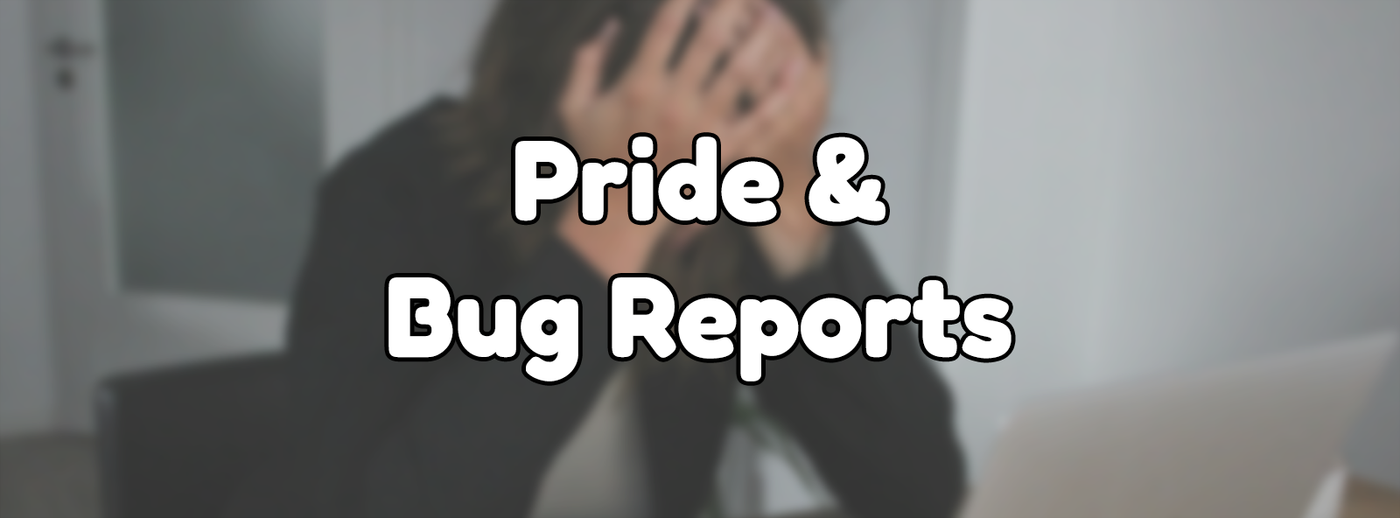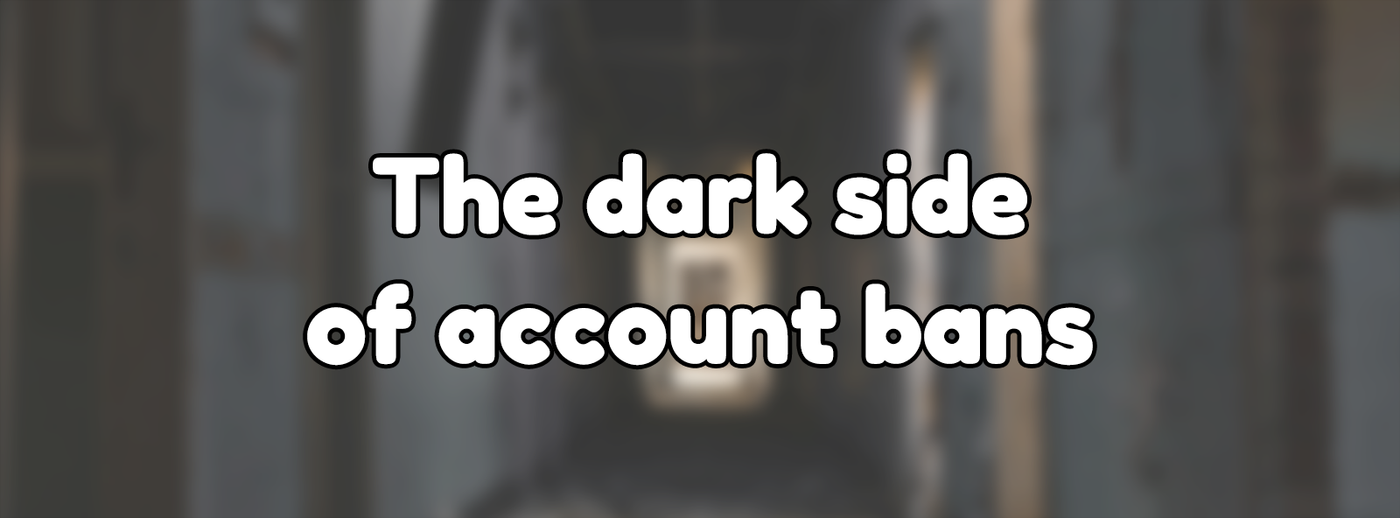
The dark side of account bans
Posted on May 7, 2025 by Maddy Miller
In Technology with tags Accessibility, Community, Retrospective
1635 words, 6 minutes to read
In the modern world, online accounts are ubiquitous. You’ve likely got so many that you’d have trouble actually counting them. Almost everything you do requires an account at this point. This wasn’t something I put too much thought into, beyond the mild annoyance of having to sign up to yet another website, until I was recently locked out of all Meta services for nearly two months. This experience was eye opening; it shocked me at how fundamental online platforms owned by companies have actually become to modern life.
Just as a quick addendum, since writing this article Meta account bans seem to have significantly worsened and gained mainstream media attention. Due to this, many people are finding this article while trying to get their account unbanned and contacting me. I am regrettably unable to do anything about your account bans, I have no affiliation with Meta, nor am I in contact with anyone at Meta. There is nothing I can do, and I would request that you please do not contact me about this.
What happened
For some background context, I develop a few Minecraft mods that are reasonably popular. If you’re not familiar with game modding communities, they can be quite toxic sometimes, with mod developers facing significant harassment from certain users. Because we were waiting for mod platforms to stabilise before publishing a final release of WorldEdit for a recently released Minecraft update, opting to only publish development builds until we were confident that it wouldn’t suddenly break, I received an anonymous threat.
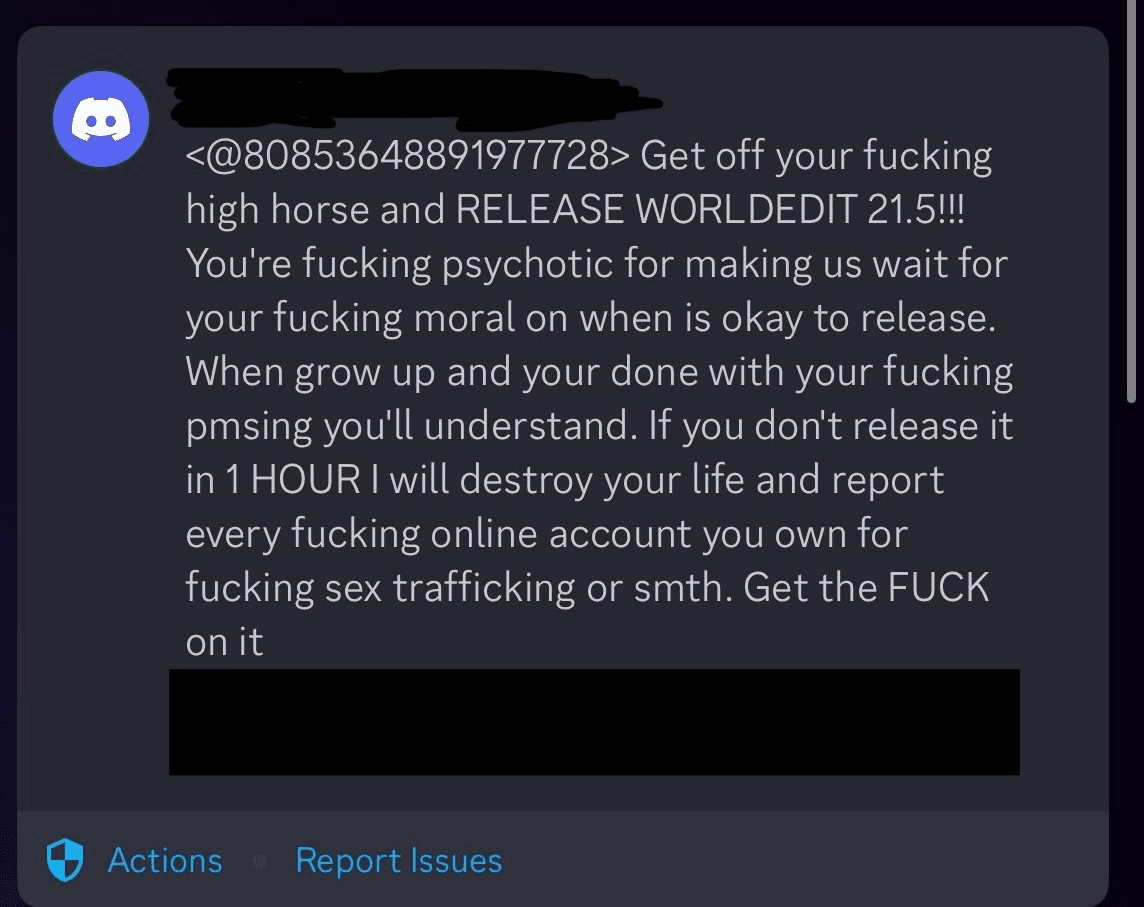
As threatened, this person attempted to get my online accounts banned. I’m not sure how many they reported, but a few hours later I was notified that my Facebook, Instagram, and WhatsApp accounts were all permanently banned. Allegedly Meta has a 17-strike policy when it comes to the type of report they threatened, which likely means I was mass reported by them and their friends. I was informed that I would not be able to create a new account, and to never attempt to gain access to a Meta-related system again. These kinds of threats were not new to me; I get hundreds a month. This was also not the first time I lost an account due to an angry user; I lost my PayPal account a few years ago and had to make a new one, due to a similar incident.
I got absolutely nowhere with support. I even paid for my partner’s account to access paid support, in an attempt to get in contact with a real person. I did end up speaking to a few engineers at Meta through connections, either directly or through others, many of which recommended suing Meta to unlock my accounts. This was extra complicated due to me living in Australia, so it’s not something I tried. Eventually, I decided to make a tweet about it. Despite the armies of spam bots that immediately inundated my notifications, eventually someone with the ability to unban accounts saw the tweet and unbanned me. The only way I managed to get my account back was sheer luck, likely heavily assisted by the number of people with large follower counts who retweeted my post. If I was not as connected as I am online, I likely would’ve been entirely out of luck.
The dark side of account bans
Now you might be thinking, “Maddy, losing a Facebook account isn’t the end of the world, right?” And yes, that’s what I thought too. I’d always wanted to reduce my reliance on Facebook, and I initially took this as a good excuse to. I was not at all anticipating how hard it would be.
Communication
Facebook is a social network, so the most obvious issue you’d face is losing contact with people on the platform. In Australia, a vast majority of people purely use Facebook Messenger as the way to keep in touch with people. While I’m not happy about it, that’s the current reality of Australian culture. My understanding is that it’s a similar situation with WhatsApp and most of Europe. This meant that not only did I immediately lose access to all of the group chats I was in, I lost my ability to actually contact many people. I don’t save people’s numbers in my contacts because I have everyone on Facebook Messenger, and I never call my friends on the phone.
When I did find alternative ways to contact people, or had other people do it for me, I was met with “Oh I don’t text, do you have Insta or WhatsApp?” If you haven’t noticed the pattern there, both of those platforms are owned by Meta. In Australia, Meta have a near monopoly on the concept of online communication.
Aspects of daily life
A few weeks into my “WorldEdit user”-ordered Meta detox, I tried to organise brunch with a friend. She recommended a few cafes, and I went to look at their menus. To my surprise, I couldn’t access their menus. They were only on Instagram, and it’d force a sign in before showing me the content. This was, of course, concerning. I hadn’t thought much about it beforehand, but so many restaurants and cafes here purely use Instagram (or sometimes Facebook) to host their menus, public holiday trading hours, or other important announcements.
I then went to sell some old PC hardware and asked around for a good marketplace to use. eBay had completely unreasonable fees, and the other ones used in Australia just didn’t have the right demographic to make that sort of sale. If I wanted to successfully sell something like that second hand, I needed to use Facebook Marketplace.
I was looking up the event times for something I was interested in going to, but I found that they only published their events on Facebook. Not only that, but they also wanted RSVPs, which of course yet again required access to Facebook.
By not having access to Facebook, I lost the ability to look at menus and check open hours, the ability to buy and sell second hand items, and the ability to attend public events. These platforms have managed to cement themselves so deeply, that by not using them you’re cut out of certain aspects of society.
Not just Meta
While my experiences here were all related to Meta products, this is of course not just an issue with Meta. Different people will be affected by different account losses to different degrees, but most people will have at least one account that’ll severely impact their life to lose. With the growing popularity of single-sign-on providers such as Google, this could even affect access to entirely unrelated services. This article is not a complaint about Meta; it’s a wider discussion on how we as a society have allowed platforms like Facebook to become borderline necessary to participate in society. It’s about how a company is allowed to be the sole decision maker in whether you can participate in those areas of society. My experiences are a case study, sadly of an experience that is growing more and more common.
What needs to change
When you think of account bans, you probably think of all of those spam accounts DMing you scam links. Or hate groups having their content taken down. What you probably don’t think about though, are all the people who are maliciously reported, the people who are just incorrectly flagged by AI moderation tools, or those who’s accounts might’ve been hijacked by malicious users. Many of the people affected by this might be less tech savvy. Not able to work out why this happened, or how they can fix it. All they know is that one day, they were cut off from a large portion of their social lives. They might’ve lost precious memories, contact with people they went to school with, or the ability to participate in certain areas of society.
Most large companies have fairly poor customer support, especially when it comes to appealing banned accounts. For every real person who’s just had their life upended by an undeserved account ban, there are also malicious actors abusing the support systems for their own gain. This creates a situation where companies cannot dedicate enough resources to customer support. In my research attempting to regain access to my Facebook account, I found that small claims court has actually become a common tactic to get accounts unbanned.
We’re in a situation where companies have managed to embed themselves so far into society, that they’re acting like providers of social services. The issue is they’re not held accountable to the same degree. I’ve written before about a false positive VAC ban I’ve received on the Steam platform, in the game Rust, and how those bans are intentionally used to socially ostracise people who cheat in video games. While that incident did affect my income at the time due to working on game anticheat software, and VAC bans have affected professional gamers in a similar way, that is far less of an issue than something like this.
If you Google, or search any social media site, a phrase such as “[Company] banned my account,” you’ll find hundreds of posts like this. People are cut off from their social network and completely lost about what to do. Not having proper customer support is normalised. This needs to change.
Conclusion
Now that I actually have my account back, I’m more comfortable making this post. I don’t want this to come across as someone complaining because she’s lost her account. It’s scary just how easy it is to lose an account. I did nothing wrong beyond being a woman who’s visible on the internet. If you do lose an account, getting it back is extremely difficult unless you have connections. I got my account back purely by luck. I cannot even imagine what this feels like for someone who’s less tech savvy than I am.

